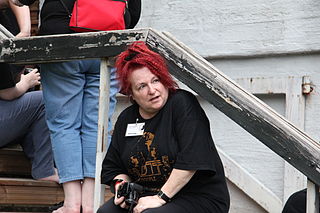A Quote by Seth Shostak
The cosmos is three times as old as Earth. During most of creation's 14 billion year history, our solar system wasn't around. Nonetheless, the early universe still had the right stuff for life, and contained worlds that were just as suitable for spawning biology and intelligence as our own.
Related Quotes
We on Earth have just awakened to the great oceans of space and time from which we have emerged. We are the legacy of 15 billion years of cosmic evolution. We have a choice: We can enhance life and come to know the universe that made us, or we can squander our 15 billion-year heritage in meaningless self-destruction. What happens in the first second of the next cosmic year depends on what we do, here and now, with our intelligence and our knowledge of the cosmos.
Our planet has been around only for four and a half billion years. Let's imagine a planet that has life on it such as life is on Earth and it's seven billion years old. Let's say that planet evolved intelligence. Well, that intelligence would be way more advanced than what we call intelligence here on Earth. How long has intelligence been around on Earth as we've come to define it?
We've begun at last to wonder about our origins, star stuff contemplating the stars, organized collections of ten billion billion billion atoms contemplating the evolution of matter, tracing that long path by which it arrived at consciousness here on the planet Earth and perhaps throughout the cosmos. Our obligation to survive and flourish is owed not just to ourselves but also to that cosmos, ancient and vast, from which we spring.
I tell my students, with a feeling of pride that I hope they will share, that the carbon, nitrogen, and oxygen that make up ninety-nine per cent of our living substance were cooked in the deep interiors of earlier generations of dying stars. Gathered up from the ends of the universe, over billions of years, eventually they came to form, in part, the substance of our sun, its planets, and ourselves. Three billion years ago, life arose upon the earth. It is the only life in the solar system.
Light is the only connection we have with the Universe beyond our solar system, and the only connection our ancestors had with anything beyond Earth. Follow the light and we can journey from the confines of our planet to other worlds that orbit the Sun without ever dreaming of spacecraft. To look up is to look back in time, because the ancient beams of light are messengers from the Universe's distant past.
If we could magically transport ourselves back to the young Earth, when it was only a billion years old or two billion years old or three billion years old or four billion years old, we wouldn't be able to survive. We would have a hard time surviving if we were transported to the time when dinosaurs were around.
Discovering that our solar system has many more planets than we ever expected, and that most of them are ice dwarfs rather than like Earth and the other rocky terrestrials, is just another step in the revolution in viewpoint that removed the Earth from the center of the physical universe and makes Earth all the more special.
This is a living planet. Look around. Mars, Venus, Jupiter. Look beyond our solar system. Where else is there a place that works, that is just right for the likes of us? It has not happened just instantly. It is vulnerable to our actions. But it's the result of four and a half billion years of evolution, of change over time. And it changes every day, all the time. It would be in our interest to try to maintain a certain level of stability that has enabled us to prosper, to not wreck the very systems that give us life.
This brief century of ours is arguably the most significant one in the history of our universe. We'll have the technology either to self-destruct, or [to] seed our cosmos with life. The situation is so unstable that I doubt we can dwell at this fork in the road for more than another hundred years. But if we end up going the life route instead of the death route, then in a distant future our cosmos will be teaming with life, all of which can be traced back to what we do-here and now. I don't know how we'll be thought of, but I'm sure that we won't be remembered as insignificant.































